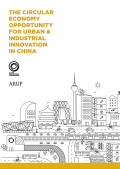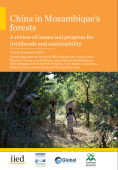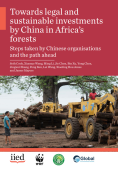
The study China's National Emissions Trading Scheme: Integrating cap, coverage and allocation explains the approach implemented in China's national Emissions Trading Scheme (ETS) to integrate its cap, coverage, and allocation. The combination of top-down and bottom-up approaches is designed in a way that it addresses China's economic, technical and bargaining costs issues. Furthermore, it also discusses the challenges of the implementation of this combined approach and puts forward the relevant policy suggestions.

The Circular Economy Opportunity for Urban and Industrial Innovation in China shows that applying circular economy principles at scale could save businesses and households approximately CNY 70 trillion by 2040 (16% of China’s projected GDP). It identifies opportunities across five focus areas: built environment, mobility, nutrition, textiles and electronics.

Resource efficiency is a key approach to decoupling economic growth from environmental degradation while enhancing human well-being. It stimulates innovation, the creation of new industries, and boosts economic competitiveness. Ultimately, it is good not only for the environment but also for the economy.
Resource efficiency is both a requirement and an opportunity for sustained economic prosperity in G20 countries - a dynamic group of leading economies with a diverse set of visions and approaches for sustainable development, and member states all over the world. The collective impact of this group could drive large-scale transformation in a direction that can lead us to the achievement of the Sustainable Development Goals.

China in Mozambique's Forests: A review of issues and progress for livelihoods and sustainability, compiles three years of work of the China-Africa Forest Governance project to develop evidence on constraints and opportunities for forest resources in productive and resilient land use and trade, to develop capacity and dialogue among relevant stakeholders in China and Mozambique, and to deliver policy and practice improvement opportunities.

This report summarises progress made by the IIED China-Africa Forest Governance Project, and shares insights from project experiences into the state of China’s role in African forest governance and provides suggestions for the next steps in the China-Africa relationship.
